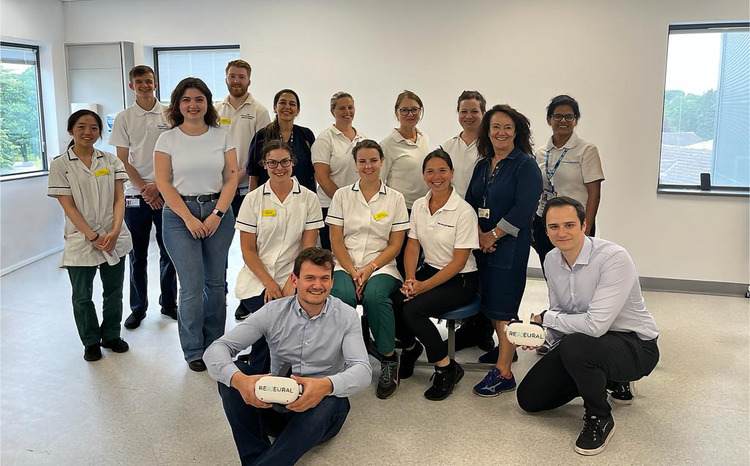Digital Health Networks webinar debates Federated Data Platform
- 19 September 2023

NHS England’s proposed Federated Data Platform (FDP) was the subject of a lively Digital Networks Webinar debate on September 8, with opponents of the project convincing enough that they flipped initial 69-39% audience support for the FDP at the start of the event to a 51 to 49% no vote.
The £480 million project has garnered significant controversy, largely due to the presumed leading contender to operate the platform, US data analytics giant Palantir. Legal activists and others have criticised Palantir’s work with intelligence and security services in the US, saying this makes it a questionable choice for managing NHS England’s trove of personal health data.
They have also suggested that Palantir’s public comments on the process suggested it was largely interested in monetising the data at a later point.
Critics have also expressed concerns about the tender process for the FDP, with Palantir widely viewed as having a clear advantage in bidding for the operating contract due to its existing work during the pandemic helping the government manage Covid data at no cost.
The Digital Networks debate on FDP largely focused on the resilience of the user cases around the FDP model itself, rather than the procurement process, with speakers arguing for or against the motion “that the FDP offers an effective way to significantly enhance data and analytics capabilities in support of patient pathways for all ICSs and trusts in England”.
While its supporters highlighted the benefits of the model to sharing data across the NHS and touted impressive results from pilot projects at Chelsea and Westminster Hospital, opponents were adamant that the case for such a significant financial investment had not yet been made successfully, and that NHS England had at the very least fumbled its communication with clinicians and the wider public.
Questions about workability of FDP model
During the first half of the debate, chief data officer for NHS England Ming Tang presented the health service’s arguments for the platform, while Haris Shuaib, consultant clinical scientist and head of the Clinical Scientific Computing section at Guy’s and St. Thomas’ NHS Foundation Trust articulated the case for those sceptical of the project.
“FDP is a key strategic investment in the architecture of the NHS, and it is in a position to support the way data is used in decision-making,” Tang said. By bringing together disparate data from different IT systems into a single platform for workflows, FDP has the potential to improve connectivity, help build resilience and drive innovation, she added.
“This isn’t about collecting more data but about having right data at right time. FDP will address privacy concerns by introducing encryption technology. Each hospital will have its own platform but will be interoperable.”
Tang also addressed prevalent concerns about how the information on FDP’s platform will be controlled, emphasing that the platform will operate as open architecture and that any data generated will be owned by the NHS and stored on government servers.
Addressing the project’s eye-watering price tag, Tang argued that operating a single procurement process was a strategic investment in data analytics that “represents real value for money – less than £300,000 per NHS organisation,” and that the health service planned to make investments in training and implementation as part of the project. Moving to the federated platform also would support standardisation and reduce variation, she added.
Although Tang acknowledged that more could and needed to be done on communications, she said Palantir had become something of a distraction and a lightning rod.
Finally, she said that other approaches and alternatives had been examined but this offered the best option on standards and gaining benefits at scale. Crucially she stressed that the FDP would evolve.
Speaking against the motion, Shuaib acknowledged that the project was “ambitious” and that “there is incredible value in national commissioning, and significant impact in coordinating data and linking it across the country”.
“I think there is incredible value in national commissioning, significant impact in coordinating data and linking it across the country” he said. “Once the conversation goes beyond ambition and intention, data becomes complicated.”
Shuaib added that the scope ambition and way in which the FDP project has been communicated “has echoes of the program for national IT”, especially in its haste and design and the failure to engage with key stakeholders.
He concluded: “I welcome the concept of open architecture, it is close to my heart, but these are not easy topics. These are decade long endeavors that require an incredible amount of coordination to achieve. This will live or die on the capacity of the NHS system and the people in it.”
Shuaib warned that the lack of sufficient preparation of the workforce and failure to look at the capacity of the system as a whole did not bode well for the FDP.
Tools to standardise pathway management
Bruno Botelho, deputy chief operating office and director of digital operations at Chelsea and Westminster and GP Marcus Baw took up the motion in the second half of the debate, with Botelho reporting strong results from FDP pilot projects at his trust and Baw worrying about the lack of a detailed plan for how the platform would be used in practice.
Botelho noted that the impetus for cooperating with NHSE on the pilot project for the FDP came in 2019 when C&W implemented an electronic patient record (EPR) and still found itself with a “fragmented system” that required the use of multiple systems to manage patient pathways.
“We saw the opportunity to fulfill a vision we had that users could access a single point of a system or tool that could manage the pathway from end-to-end,” he said, adding that contrary to worries that an FDP would be overly centralised, C&W had the opportunity to develop tools within its organisations and tailor them to the needs of their own healthcare professionals.
Botelho added that his team consulted with frontline staff to find out their problems and challenges, as well as enlisting the help of multiple suppliers and came up with the tool that became one of the user cases for FDP. The pilots were ultimately extended to North West London and to 30 organisations around the country.
“At the ICS level, we have the ability to move from one trust in the sector to another trust to manage data.” he said. “I am in favour because I do think the FDP offers an effective way to significantly enhance the data analytics to operationally support the management of the patient pathway and there is an element of scaleability and adoption that can standardise the approach across the NHS.”
For Baw, meanwhile, the FDP was answering the wrong question, bringing the health service’s priorities into question.
“Yes, perhaps an FDP does provide value and benefits, but if you had more administrative staff, you could enhance pathways. Such an enormous expenditure on FDP as if it is the only way to improve things,” he said. “At a time when staff shortages are hard. It’s not a good look for a national health service to spend hand over fist on data platforms when it can’t pay its staff.”
He also expressed concerns that the project so far remains ill-defined and threatens to blur the lines between research, planning and population healthcare.
“We are dealing with a concept and a process that is still evolving. The FAQs talks about five main use cases that are a jumble across NHS, and constitute a jumble of legal use,” he said.
He concluded that he would find it difficult to advise his general practice patients on the security of their data in the FDP under current proposals. “As a clinician, I have patients who might not come to see the doctor out of concern that data entered by me might end up in the hands of other people who weren’t parts of that conversation. I worry we will have a mass opt-out as a result of that.”





2 Comments
Well that FoI leaves us pretty much as confused as ever. The myriad number of exceptional circumstances adn opaque use of data by third parties especially when that data has left the Data Controllers environment does absolutely nothing to reassure any body. Here is a scandal of gargamtuan size. The government intends to keep the entire population totally uninformed of FDP untill implementation is well underway. https://data.parliament.uk/DepositedPapers/Files/DEP2023-0696/Brine2.pdf
Well, if you’re interested in the FDP opt-out….
https://www.whatdotheyknow.com/request/fdp_and_ndoo#incoming-2414189
Neil
Comments are closed.